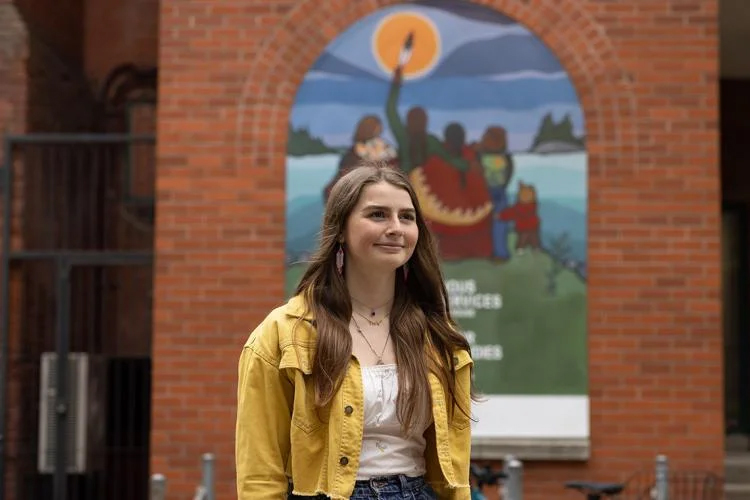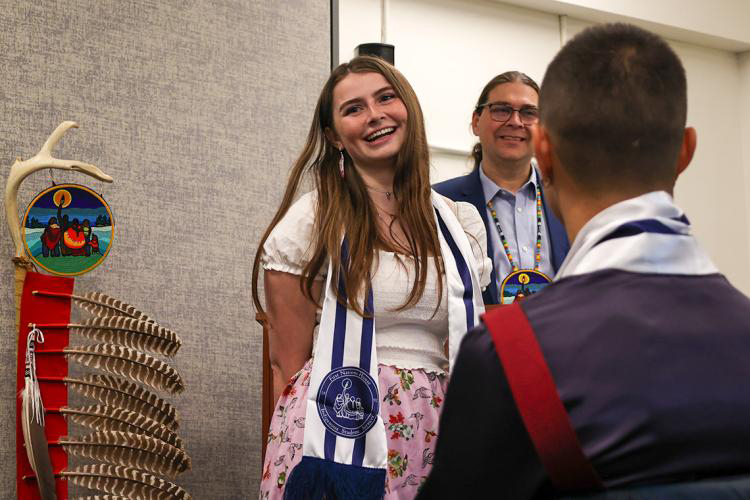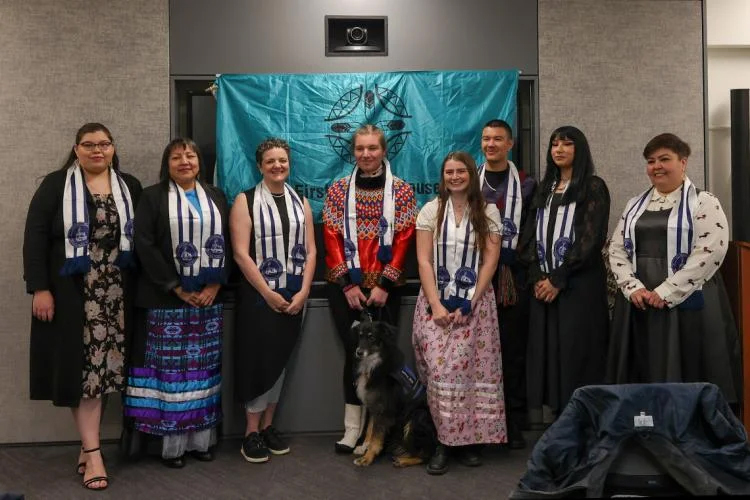Alicia Corbiere says she felt like there wasn’t a place for her Indigenous identity inside the classroom before she came to the University of Toronto.
Growing up, Corbiere says, her mother pulled her and her sister out of school to give them first-hand lessons in history through her work as a lawyer and executive director of the Truth and Reconciliation Commission.
Kimberly Murray brought her daughters to national events held by the commission to hear witnesses share their stories about the harms and painful legacy of Canada’s residential school system.
“[My mom] would tell us, ‘This is important. They’re going to teach this in history classes,’” Corbiere says. “I remember I didn’t believe her at the time.”
Her skepticism stemmed from her personal experience in elementary and high school. Corbiere, who is Ojibwe and Mohawk, says on the rare occasions her teachers touched on Indigenous subjects, they would often ask her to educate rest of her class since she was the only Indigenous student.
“They’d be like, ‘Oh, Alicia, how do you pronounce this?’” Corbiere recalls. “And I was like, ‘Well, I’m not Mi’kmaq, so I can’t pronounce that.’”

When it came time to apply to university, Corbiere says she worried she wouldn’t fit into the world of academia — until she discovered that U of T offered a program where she could engage with her heritage, history and culture from a scholarly perspective.
“I didn’t even know Indigenous studies existed,” Corbiere says. “That is the reason I chose the school.”
Four years later, Corbiere is graduating from the Faculty of Arts & Science as a member of University College, with a double major in criminology and Indigenous studies.
Both in the classroom and at First Nations House, Corbiere says connecting with her community at U of T has given her the confidence to join the family business of making history by studying Indigenous law when she enters U of T’s Faculty of Law this fall.
“It’s important for us to not feel embarrassed or [deterred from] focusing on our own scholarship and academics,” Corbiere says. “Indigenous studies has so much to offer — and that should be taken seriously.”
While her mother made a point of immersing her in the Indigenous community of Toronto, Corbiere says she drifted away from her culture as a teenager.
But that changed once Corbiere started taking Indigenous studies courses taught by Indigenous professors who challenged “damaged-centred” narratives that reinforce stereotypes about Indigenous Peoples being broken or conquered. In their place, Corbiere engaged with research frameworks rooted in resilience and cultural reclamation.
“When I came to U of T, that's when I was able to really return to how my mom raised me, how she wanted us to see ourselves and live our lives.”
Corbiere also started studying Anishinaabemowin.
“That completely changed my life in every way,” she says. “People say you start seeing the world a little differently once you learn about a second language, and I feel that way about my language.”

Soon after arriving at U of T, Corbiere became a fixture at First Nations House. But she says when COVID-19 turned campus life upside down, she found herself feeling disconnected from her community.
After about two years of remote learning, Corbiere says was eager to get involved in extracurricular activities. She was tapped to help revitalize the Indigenous Students’ Association (ISA), which introduced her to Indigenous students from a wide range of disciplines — many of whom hadn’t yet had the chance to find community in the classroom.
“I had a lot of people tell me, ‘This is the first time I'm making Indigenous friends at U of T,’” she says. “To be able to be a part of bringing the ISA back and bringing so many people together has been so special for me.”
As one of the ISA’s Marten Clan leaders, Corbiere helped cook lunches, planned special events and hosted an Anishinaabemowin study group.
Michael White, director of U of T's First Nations House and Indigenous Student Services, said he’s confident Corbiere will bring that same community-building spirit to U of T Law.
“She brings such a positive mental attitude and a willingness to engage. These are really important qualities as she moves into this sphere of life,” White says. “She’s going to do amazing things.”
While she had her pick of graduate schools, Corbiere said she decided to stay at U of T because of the opportunities to learn about traditional law and legal sovereignty from scholars such as John Borrows, a professor and Loveland Chair in Indigenous Law.
It’s likely that she’ll come across a few familiar names in her coursework.

Her father, Gary Corbiere, was among the lawyers who successfully argued the landmark case Corbiere vs. Canada, in which the Supreme Court of Canada found that a section of the Indian Act restricting off-reserve band members from voting in band elections was in violation of the Charter. He drowned when she was three years old, prompting Murray to put her two daughters in swimming lessons — a decision that ultimately led the pair to competitive swimming when they got older.
Meanwhile, Murray followed up her work with the Truth and Reconciliation Commission by becoming Ontario’s first assistant deputy attorney general for Indigenous Justice. Last year, the federal government appointed Murray as independent special interlocutor for missing children and unmarked graves and burial sites associated with former residential schools.
Corbiere says her undergraduate studies at U of T have set her up to build on her family’s legal legacy.
“Just seeing what my parents accomplished — especially my dad in his short life — has really inspired me to continue on,” said Corbiere. “My mom worked on a lot of criminal law cases and cases working with Canadian law, but now she talks a lot about how important legal sovereignty is.
“I feel like I can pick up from where she left off.”

